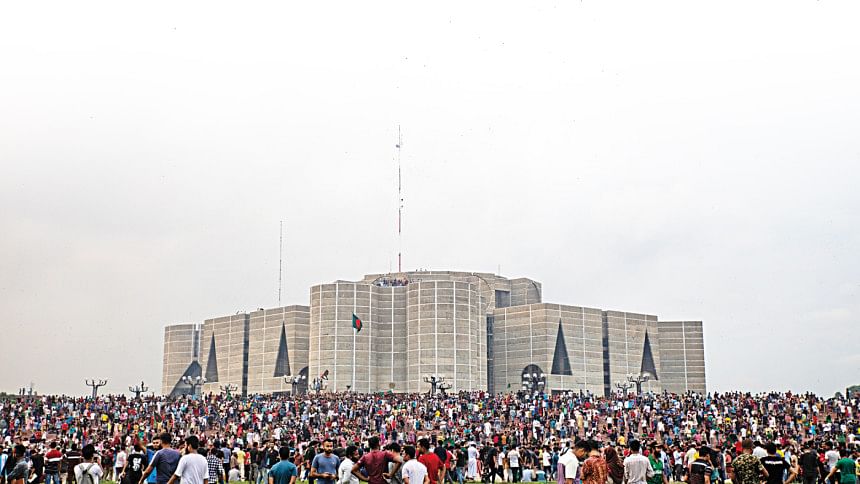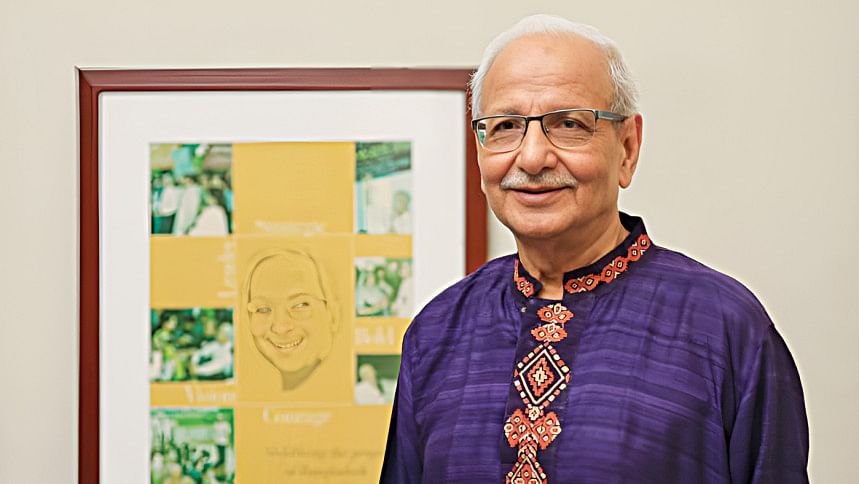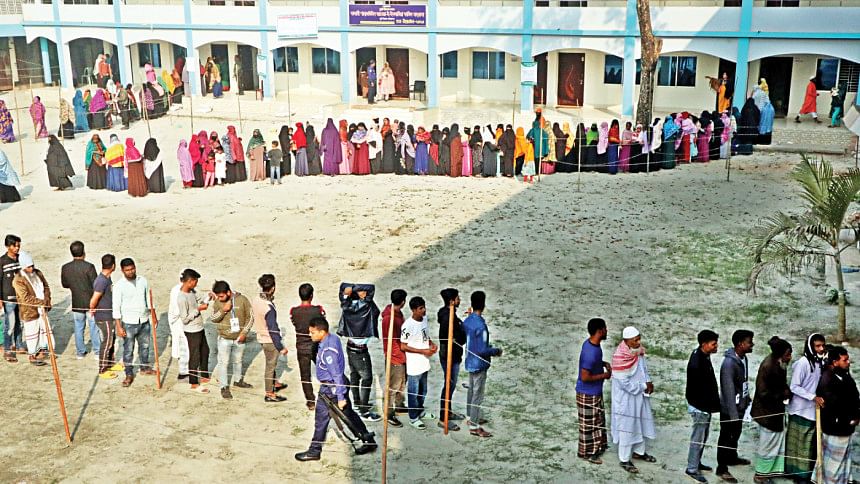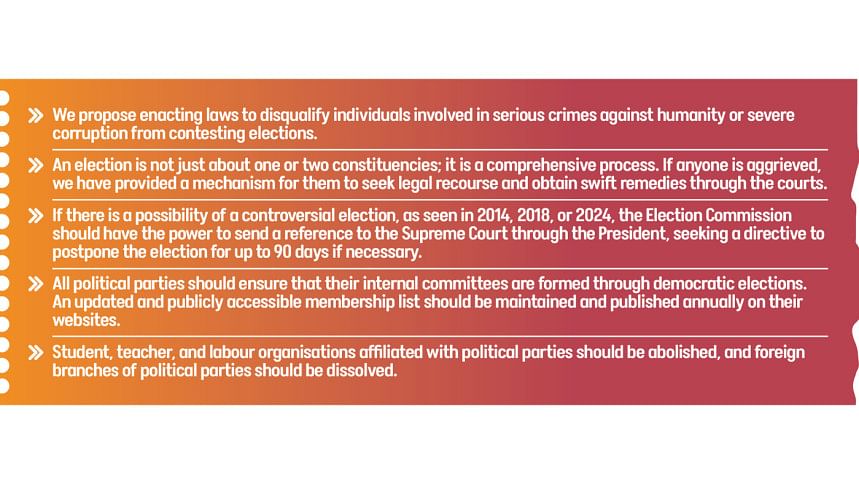Election commission’s power over executive bodies key to election integrity

The Daily Star (TDS): Could you please share how your commission functioned and what outcomes it achieved?
Badiul Alam Majumdar (BAM): First and foremost, we have thoroughly reviewed all relevant laws, rules, and regulations. At the same time, we have sought opinions from political parties by collecting their written proposals. Additionally, we have gathered feedback from various stakeholders through websites, emails, and Facebook, as well as through direct discussions.
Based on this, we have made approximately 150 recommendations, some of which focus on ensuring credible elections. Our electoral space has become criminalised, polluted, and frequented by undesirable individuals. In many cases, criminals are now being elected. During discussions with us, many have expressed concerns that such individuals should not be allowed to enter the esteemed institution of the Jatiya Sangsad Bhaban. To address this, the electoral process must be cleaned up.
To this end, we have put forward several clear recommendations. For instance, we propose enacting laws to disqualify individuals involved in serious crimes against humanity or severe corruption from contesting elections.

We have recommended a provision ensuring that fugitive accused individuals cannot participate in elections. Those convicted by judicial or international courts should be deemed ineligible from the date of their conviction.
We have also proposed introducing a "No Vote" option. The affidavit format has been revised to allow for verification, ensuring that any assets held abroad by candidates are disclosed. Additionally, after the election, the Election Commission must certify that the election was conducted fairly and acceptably.
For those imprisoned within the country, they may submit their nomination papers through the prison authorities, subject to permission. However, all others must submit their nomination papers in person. This measure is intended to prevent criminals, fascists, and individuals involved in serious crimes—such as crimes against humanity, severe human rights violations, enforced disappearances, murders, extrajudicial killings, repression, and torture—from contesting elections. Given the deep wounds inflicted on our country, it is essential to keep such individuals away from the electoral process and the political sphere.
We have also proposed introducing a "No Vote" option. The affidavit format has been revised to allow for verification, ensuring that any assets held abroad by candidates are disclosed. Additionally, after the election, the Election Commission must certify that the election was conducted fairly and acceptably.
An election is not just about one or two constituencies; it is a comprehensive process. If anyone is aggrieved, we have provided a mechanism for them to seek legal recourse and obtain swift remedies through the courts.
TDS: Given the past three major fraudulent elections, what measures would you suggest to prevent future electoral malpractice?
BAM: In the 2018 and 2024 elections, the Election Commission simply announced the results as received from the returning officers. Now, we have assigned them a specific responsibility to certify whether the entire election was conducted properly before making any official announcement. If anyone disagrees with their decision, they have the right to appeal to the higher court, which must resolve the matter within seven days.
We have proposed a provision for re-elections in constituencies where voter turnout falls below 40%. Additionally, to hold accountable those who turned the 2018 and 2024 elections into a mockery, we have suggested forming a special commission. This commission will also investigate judicial authorities who played a role in legitimising these controversial elections.
If wrongdoing goes unpunished, it only encourages further misconduct. Domestic and international observers play a crucial role in ensuring fair elections, so we have recommended changes to relevant policies. Furthermore, we have emphasised the need for a media policy to support transparency in the electoral process.

TDS: What key reforms do you propose to strengthen the Election Commission's independence, accountability, and effectiveness?
BAM: Our primary recommendation regarding the formation of the Election Commission is to clearly define its structure, responsibilities, powers, and accountability. We propose that the appointment of Election Commission members be based on a consensus among political parties. Additionally, the commission should remain accountable to a special parliamentary committee both during its tenure and after retirement, as no such accountability mechanism currently exists.
If negligence in duty leads to electoral misconduct, the Election Commission should be held accountable under Sections 76 to 89 of the RPO. Any wrongdoing by commission members must have consequences.
We also advocate granting the commission absolute authority in finalising election candidates. Ensuring its financial independence and giving it the power to appoint its own secretary are crucial steps.
Furthermore, we recommend repealing the law that transferred the national ID system to the Ministry of Home Affairs and reinstating it under the Election Commission, a measure that has already been implemented.
Additionally, if allegations of electoral fraud arise in any constituency, the Election Commission should have the authority to investigate and, if necessary, annul the election and order a re-election.
The Election Commission should be entrusted with ensuring the security of candidates and their agents. Moreover, any actions by the executive branch that could influence the election process must require prior approval from the Election Commission. In other words, the commission's authority over other executive bodies is crucial for maintaining election integrity.
If there is a possibility of a controversial election, as seen in 2014, 2018, or 2024, the Election Commission should have the power to send a reference to the Supreme Court through the President, seeking a directive to postpone the election for up to 90 days if necessary.
TDS: What key reforms would you suggest for political parties?
BAM: To cleanse political parties of criminal influence, we propose that individuals convicted of serious crimes, crimes against humanity, human rights violations, or fugitives should not be allowed to become party members. Anyone found guilty by judicial courts or international criminal courts should be disqualified from both elections and party membership.
All political parties should ensure that their internal committees are formed through democratic elections. An updated and publicly accessible membership list should be maintained and published annually on their websites. Only registered members should be allowed to participate in electing party committees.
Additionally, student, teacher, and labour organisations affiliated with political parties should be abolished, and foreign branches of political parties should be dissolved.
To ensure financial transparency, political parties must manage their funds and donations through the banking system, with all transactions being audited. The Election Commission should publish these audit reports for public scrutiny.
Election expenses fall into two categories: visible and invisible. Visible expenses can be regulated, and political parties may be compelled to comply to some extent. However, vote-buying remains hidden, and nomination trading also occurs entirely behind the scenes in various forms. There is no concrete evidence of these practices, and without verifiable information, corrective action cannot be taken. Addressing these issues largely depends on the sincerity of political parties and the vigilance of citizens.

For women's empowerment, we propose a rotational system, increasing the number of reserved seats for women to 100. The total number of parliamentary constituencies should be expanded to 400, with 100 seats reserved exclusively for women. These seats should be contested only by qualified female candidates, ensuring direct elections rather than nominations. This will provide women with equal responsibilities, rights, and opportunities as men. Over time, as gender parity in politics improves, such reservations may no longer be necessary. A similar model has been successfully implemented in India's panchayat elections and has proven highly effective.
There is currently a gender gap in voter registration, with the number of female voters declining despite women constituting a slightly larger percentage of the population than men. This discrepancy must be addressed to ensure fair representation.
Ensuring voting rights for expatriates is crucial, as they constitute approximately 15 to 20 million of our population. If they are deprived of their voting rights, the legitimacy of our elections may be questioned. Therefore, they should be included in the voter list and allowed to participate in elections either through postal ballots or an e-voting system.
TDS: What key reforms do you propose for strengthening the local government system and ensuring fair governance?
BAM: We have proposed reforms in the local government system. Currently, there are nine general seats and three reserved seats for women, totalling 12 members in local government bodies. We recommend increasing the number of general seats from nine to 12 and reserving four seats for women instead of three.
Additionally, we propose making local government elections non-partisan and holding them before national elections in a rotational manner. To ensure fair governance, we suggest forming a permanent Local Government Commission, which will oversee the election process, prevent undue dismissals of elected representatives by bureaucrats, and establish a financial decentralisation framework.
TDS: What reforms do you propose for the presidential election?
BAM: Regarding the presidential election, we propose expanding the electoral college to include not only Members of Parliament but also all elected local government representatives. This would create a much larger electoral body of approximately 65,000 to 70,000 members, ensuring that only qualified individuals are chosen as President.
TDS: How has the debate over the Proportional Representation (PR) system evolved in your political context, and what are the prevailing opinions on its implementation?
BAM: Many who initially supported the Proportional Representation (PR) system are now opposed to it because, in our political context, they do not want representatives of fascist regimes to return to power. Most people do not want the Lower House to be part of the PR system. However, there is widespread support for implementing the PR system for the Upper House. In our country, the stance of political parties often shifts depending on whether they are in opposition or in government.
TDS: How confident are you in achieving free and fair elections in the future?
BAM: It is evident that holding a fair election does not solely depend on the Election Commission; it is ultimately a political decision. If our politicians decide that they do not want a fair election, even the strongest Election Commission would find it nearly impossible to ensure one. However, the Election Commission can prevent unfair, controversial, or fraudulent elections, and we have included provisions for that. Ultimately, the willingness of political parties to conduct fair elections is crucial.
If a fair electoral process is not established, it will render all efforts futile, and that would be unacceptable. It would also be a betrayal of those who sacrificed their lives in the 2024 uprising. Therefore, it is essential for our citizens to remain vocal and active in safeguarding democracy.
The interview was taken by Priyam Paul.

 For all latest news, follow The Daily Star's Google News channel.
For all latest news, follow The Daily Star's Google News channel. 



Comments